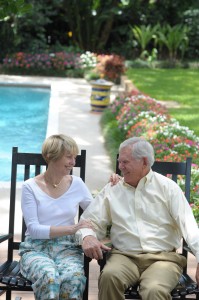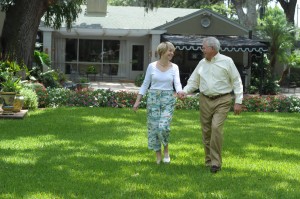Published in FirstMonday magazine, By Sarah Sekula
Bill Frederick arrived in Orlando in 1961 as a young attorney in private practice with nothing more than an old beat-up Buick, a pregnant wife and $1,500 to his name. In fact, when he bought his one-story home that year, he couldn’t afford furniture for the living room.
How things have changed.
The once-humble dwelling now holds the key to a wealth of history, particularly in the former Orlando mayor’s home office. A mahogany bookshelf is jam-packed with hefty scrapbooks. Framed photographs of political greats hang above a model ship. Tucked away in the garage is a restored military jeep.
He gathered these souvenirs of his life from various jobs and interests: while serving active duty in the U.S. Naval Reserve, his fascination with World War II and his time as mayor of Orlando from 1980 to 1992.
Present Priorities
As his U.S. Navy clock chimes, Frederick describes more recent happenings, such as his upcoming Hemmingway-like excursion to Africa with his wife, Joanne, children and grandchildren. In true Frederick style, his suitcase already is packed with hiking boots, a safari hat and various outfits, even though the trip is several days away.
Always the world-class wanderer — although perhaps a bit more cautious since a near-fatal car accident in 2006 — he has planned three weeks of big-game tracking, desert traipsing and fishing in the Indian Ocean.
“I want my grandchildren to remember me other than around the dinner table,” he says with a grin.
Gone are the days of scuttling around Orange Avenue for back-to-back meetings. The former buttoned-down mayor has plenty of time to soak up the present. After his Africa trip, he plans to create miniature versions of the Navy frigate USS Constitution – “Old Ironsides” – for each of his five grandchildren. “It’s a very absorbing hobby,” he says. And it requires a lot of patience, which he claims not to have.
In the family room, he keeps a collection of artwork and stories to go with each piece. Pointing to an original A.E. “Beanie” Backus painting, he recalls a trip south to Stuart in search of the renowned artist. Unfortunately, when he arrived, he found Backus drinking Jack Daniels and fresh out of paintings. So Frederick added his name to the long waiting list. Two years later, the painting arrived at the Orlando bus station for him with a hefty $450 price tag, which at the time was one month’s salary. Frederick, a master of persuasion, negotiated a payment plan.
The oil painting — now a rare collectible — depicts a vivid Florida landscape and mirrors Frederick’s character. “I’ve always just loved Florida,” he says wistfully. And he means it. At 74, he is still an avid scuba diver, a boating buff and the host of countless family gatherings at his wooded 700-acre ranch outside Wauchula. He even distills his own pure cane maple syrup.
Indeed, he loves his surroundings.
Although his time is less structured these days, he still garners plenty of attention. One day earlier, he rubbed shoulders with Orlando’s elite at the reopening of Dubsdread Golf Club and then zipped off to a meeting of the Orlando Performing Arts Center board. Later this month, he plans to bring former Florida Gov. and U.S. Sen. Bob Graham to speak to members of the Frederick Leadership Initiative, a networking group of young up-and-comers. He also remains part of the Florida Council of 100, a nonprofit organization that advises the governor.
It’s easy to see Frederick is not your average retiree. As his wife brings in the morning coffee, he recounts details of his past — some well-known, others surprising. For starters, he admits he “never envisioned being mayor of a city.” Before he was elected, he had never even set foot in City Hall. Beyond the gentle nudging from longtime friend Pete Barr Sr., he was motivated by the chance to complete the expansion of the Orlando International Airport. And he did. Frederick spearheaded the $1 billion project, predicting that one day it would become an international hub.
The Beginning
Initially reluctant to join the ranks of public figures, it was clear he had star leadership qualities. “Bill radiates energy and life,” says Rita Bornstein, chief fundraiser for the Performing Arts Center and the former president of Rollins College. “It is impossible to be around him without being challenged to be your very best self.”
A former public defender and newcomer to the political scene, he was mistakenly considered by others as a “Cufflinks Carl” type — an elitist disconnected from the people. Opponents nicknamed him “Dollar Bill” in his first election and joked he would assume a perch in an ivory tower. Frederick, very sensitive to criticism, was quick to change the ill-conceived perception.
“He has enormous sway over people because of his personality, intelligence and political savvy,” says Bornstein. “No one leads a meeting as well as he does or has the ability to move an agenda in the direction he wants without upsetting anyone at the table.”
Many have declared him the greatest mayor in Orlando’s history.
Manning Pynn, former Orlando Sentinel editorial-page editor also offers high praise. “Bill Frederick was easily the most dynamic individual in Central Florida during the 1980s,” he says. “He had big ideas, which he pursued aggressively and, for the most part, successfully.”
It was a time when Disney World raised Orlando’s profile dramatically. Frederick, however, was intent on making the city more than just a suburb of a whiz-bang theme park. His roll-up-your-sleeves, get-it-done attitude led to a $102 million downtown sports arena (bringing the Orlando Magic to town), a $3.3 million revamp of Lake Eola, a 22 percent reduction in crime, a $36 million City Hall and a wallop of adrenaline for the arts.
He relentlessly pushed to dress up the city in the form of brick sidewalks, open spaces and greenery. The serpentine brickwork and fountains at the arena were Frederick’s idea. City Hall’s plaza and downtown’s old-fashioned street lights all bear his stamp of approval.
In 1988, he kick-started United Arts, an umbrella fund-raising organization that championed the expansion of the Orlando Science Center, as well as the new building for the civic theater complex, and cleared the symphony’s debt.
While mayor, he also set aside land for the performing-arts center. “His keen interest in the arts is the real reason we are so near to realization of a [performing-arts center],” says Randall James, pastor of Orlando’s First Baptist Church and Frederick’s former chief of staff. “Mayor Frederick was able to convince community leaders that Orlando would never draw major corporate or Fortune 500 companies to the City Beautiful without a first-class arts presence.”
In recent years, Frederick — along with Orlando Mayor Buddy Dyer and Orange County Mayor Richard Crotty — laid the foundation for the events center and refurbishment of the Citrus Bowl.
“It’s a happy ending, but a painfully slow one,” he says, regarding the 2006 approval of the venues plan. “However, that’s how things are achieved in a community. About 98 percent of the effort is the last two percent. To actually close on these things is really hard and it takes skill. I think that’s the measure between a skilled public servant and one who’s just filling time.”
Frederick’s prodigious ideas were paying off. During each term he served from 1980 to 1992, his approval rating rose. By 1988 he had captured 77 percent of the vote. “I was never concerned with being re-elected,” he says. “If the people didn’t want me, I shouldn’t be there.”
In 2005, when Dyer was suspended after he was indicted on a charge of violating an elections law, Frederick ran again for mayor to keep Orlando’s revitalization efforts alive.
Laura Guitar, his campaign manager in that election, says she admires his ability to focus on priorities that matter most and to let everything else take care of itself. Case in point: During that brief campaign, a mailer was distributed with his name spelled incorrectly.
Guitar explains, “Mayor Bill’s response was simply, ‘If that’s our biggest worry, then we’re doing great. Let’s get back to work.’” Ultimately, Dyer returned from a six-week suspension, and a special election to replace him temporarily was canceled. Guitar says Frederick’s leadership style is enticing. “Had the campaign continued, I would have been hard-pressed not to follow him to City Hall,” she says, “even if it was just to clean his office.”
Forward Thinking
There is no doubt Frederick has a strong respect for the past, but he’s equally optimistic about the future. “I think Orlando is going to be the absolute dominant city,” he predicts. “Most great cities were built on water, and ports are what made them great. We are one of the few inland cities that has done well.”
According to Pynn, Frederick knew what he wanted his city to become. “Bill Frederick always impressed me as a man of vision,” says Pynn. “Consequently, he had little trouble persuading others to adopt his vision.”
James says Frederick “has more vision than any person I’ve ever met. His charm wins people over. His presence commands respect.”
At the same time, as with any high-profile figure, there were critics. Not everyone agreed with his priorities, and Frederick admittedly has stuck his foot in his mouth from time to time. In his defense, he contends, “You can’t do things and try to be aggressive in terms of policy without doing that. You have to let people know where you stand.”
His candid approach served him well. “He’ll tell people when he thinks they’re wrong and why,” Guitar points out. “But he does this in a way that still values the individual.”
Leaving a Legacy
Unlike many politicians, Frederick didn’t want to overstay his welcome. While many hoped he would run for governor, he concedes that he never had the desire. “I wanted to serve and then get off the stage,” he explains.
Now, he prefers to manage from the sidelines and is largely viewed as Central Florida’s elder statesman.
Frederick wears the tag comfortably and simply. That continues to be his style.
“We tend to think of highly successful people as complex characters leading complicated lives,” says Guitar. “That’s not the case with Mayor Bill. His marriage, his family, his home — they’re all testaments to his ability to keep it simple by putting the important things at the top of the list.”
Today he oscillates between trusted advisor and mellow retiree. He is perfectly content to relax on his back patio — a Xanadu of fountains and flowers, where he once regaled crowds of movers and shakers. What tops his list now are family get-togethers and close friends.
And there remain a lot of friends.


